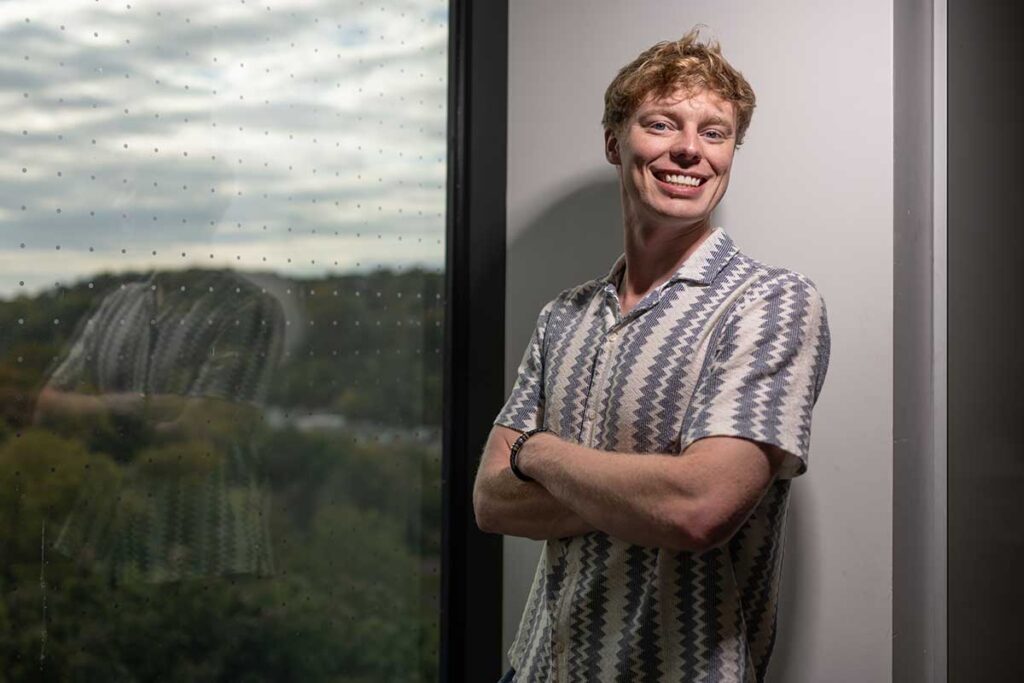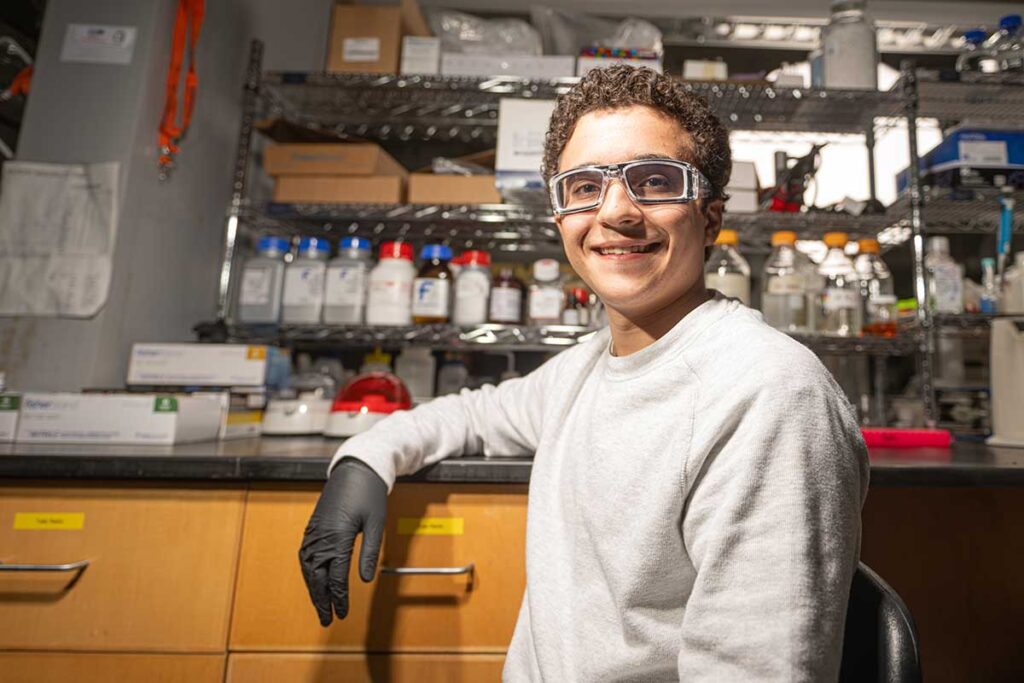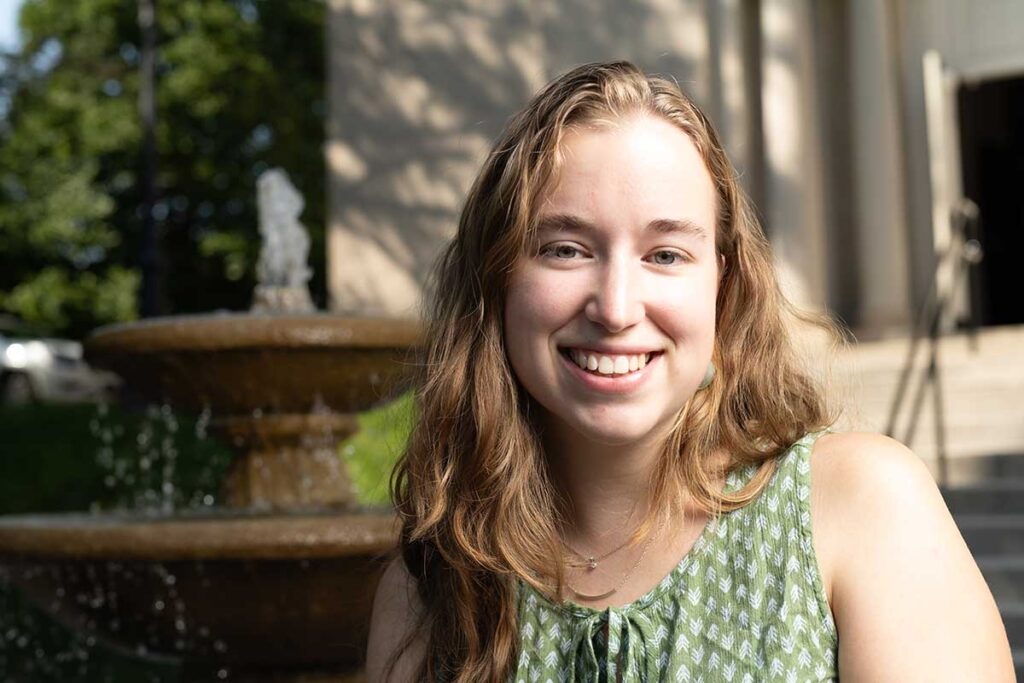Carter Brand ’25, Max Gianakopoulos ’25, and Tess Stanley ’25 talk research and inspiration, hopes for the future, and being on the frontlines of improving human health
By Stella Katsipoutis-Varkanis
The Barry Goldwater Scholarship and Excellence in Education Foundation, which honors sophomores and juniors with exceptional academic achievements who intend to earn a doctoral degree and pursue STEM research, awarded three Lafayette students with scholarships this year: Carter Brand ’25 (who was also a Goldwater Scholar last year), Max Gianakopoulos ’25, and Tess Stanley ’25.
They are among 437 college students nationwide who were chosen from 1,353 total nominations. The prestigious and highly competitive scholarship was established in 1986 to identify, encourage, and financially support college sophomores and juniors who show exceptional promise of becoming this Nation’s next generation of research leaders in the fields of the natural sciences, engineering, and mathematics.
We chatted with each of the College’s awardees to get the scoop on their academic achievements, their greatest inspirations at Lafayette, and their aspirations for the road ahead.
Carter Brand ’25

Carter Brand ’25 Goldwater Scholarship 2024
Major: Biochemistry
Post-graduation plans: Obtain a Ph.D. in neuroscience
How I want to make an impact: Contribute to knowledge of the brain. I am interested in studying a blend of theoretical and medical neuroscience to uncover the emergent properties of neural circuits in order to answer big questions, such as the origin of consciousness. I am also interested in studying novel treatments for cognitive disorders.
How would you describe yourself as a student and scholar?
I consider myself a creative student who is an innovator at heart. I enjoy making connections between seemingly disparate subjects, such as neuroscience and physics, and taking unconventional approaches to problem-solving. I am passionate about helping people and advancing our society’s health through science, so I truly enjoy putting my creative mindset to use in coming up with novel treatment ideas for diseases. I believe that one good idea is all it takes to have an effective impact on society.
Give us a rundown of your research. What about it excites your interest?
Many people experience cognitive disorders such as depression, and often struggle to receive effective treatment. I have always been sensitive to this issue, and I am interested in discovering alternative and effective treatments. My research is focused on investigating the interaction between biophotons and neurotransmitters, and how that can affect neurotransmitter receptor binding. Neurotransmitters play a big role in some cognitive disorders, so this research could shed light on possible future neurotransmitter treatments, such as modified photobiomodulation therapies. Recently, I have also been researching the tau protein, as I hope to help research new treatments for Alzheimer’s disease, a disease I have recently become passionate about.
Who has had the greatest influence on your scholarly journey?
Ken Haug, associate professor of chemistry, has mentored me through my research on neurotransmitters, and has consistently inspired me to be creative. He let me design my own research project, which is a rare opportunity that speaks to the open-mindedness of professors here at Lafayette. Michael Bertucci, associate professor of chemistry, and Bradley Antanaitis, emeritus associate professor of physics, have also helped me grow as a scientist and have encouraged me to pursue my dreams in neuroscience.
How has being an undergraduate student-researcher at Lafayette helped shape your goals?
The liberal arts structure of Lafayette has allowed me to take classes in many different subjects, prompting me to approach my research questions from multiple angles. Additionally, the chemistry department has a high-quality research environment that has challenged me scientifically and encouraged me to be innovative. This experience has enforced my love for research.
What does the Goldwater Scholarship mean to you?
It is an honor to have received this scholarship. I am grateful for my support system here at Lafayette and at home.
Max Gianakopoulos ’25

Photo by Adam Atkinson
Major: Biochemistry
Post-graduation plans: Apply to medical school and earn an M.D./Ph.D. My overall goal is to both practice medicine and pursue medical research as a future career.
How I want to make an impact: I hope to be able to integrate research and medicine to act as a physician scientist and directly face the major biomedical challenges that plague modern medicine. This would allow me to have a unique perspective, both when treating patients and performing research. I would be able to use my knowledge and unique skill sets from either side of my career field to address many of the big issues and questions that modern medicine faces. There are many medical issues that devastate the entire world year after year, and I hope to be on the frontline of the efforts to improve human health.
How would you describe yourself as a student and scholar?
I’m an eager student who aims to continuously advance his knowledge of biochemical and biomedical science, both out of genuine curiosity and a desire to put that knowledge to the task of aiding others in a medical setting. I am constantly pushing myself to learn new things and enter challenging situations in the hopes that I come out a stronger and more well-rounded student. Having a strong passion for learning about biochemistry and its intricacies is a bonus, because I am able to learn about what I love while also setting myself up to make meaningful contributions to the biomedical field with that knowledge. To me, the human body, along with biochemistry as a whole, is similar to a massive, intricate, and sometimes mind-boggling machine, which I hope to keep unraveling as my academic and professional career continues into the future.
Give us a rundown of your research. What about it excites your interest?
Antibiotic resistance is a growing issue worldwide as more and more bacteria become resistant to known antibiotic treatments, necessitating research into novel methods of fighting bacterial infections. As part of Prof. Kristen DeMeester’s lab, my research aims to characterize the relationship between a cellular process known as autophagy and bacterial peptidoglycan, the main component of the bacterial cell wall. Autophagy and bacterial peptidoglycan have been independently associated with the immune system, but their relationship with each other has never been fully characterized. This presents a massive opportunity to learn more about the body’s recognition of, and response to, bacteria, and potentially offer up a novel form of treatment in the future.
Growing up, I had learned about the growing issue of antibiotic resistance, so when I was presented with the opportunity to join Prof. DeMeester’s lab and the nationwide effort to find a solution, I was overjoyed. Being able to research this issue with a cutting-edge technique known as chemical proteomics, a methodology that allows me to ‘fish’ for bacterially relevant autophagy proteins in the cell, is a dream come true.
Who has had the greatest influence on your scholarly journey?
I have had several mentors over the course of my time at Lafayette who have greatly influenced and positively transformed every aspect of my life, for which I couldn’t be more grateful. When I first entered Lafayette as an undecided major, I was considering pursuing a biology degree but was generally confused about my interests and what I wanted to pursue. An early mentor who helped grow my interest in biochemistry was Justin Hines [David M. ’70 and Linda Roth Professor of Chemistry], who was my FYS professor during my first semester at Lafayette. He was very encouraging and began to spark what is now my passion for research as we learned about misinformation in the life sciences. He was very helpful as I applied for the Goldwater Scholarship, and was also a large driving factor behind me having my first research experience with Prof. DeMeester. I am very grateful for the opportunities and advice he has given me.
The greatest mentor I’ve had over my time at Lafayette, and the one I am most grateful for, has been Prof. DeMeester, with whom I have completed two summers of research as well as research during the school year. She has been deeply encouraging and invested in my future, and has helped me grow as a student and researcher more than I can even say. I would not be where I am today without the guidance, kindness, and support she has given me. Throughout the application process for the Goldwater Scholarship, Prof. DeMeester was invaluable in helping me craft and revise my research essay and personal statements. Performing research with her over the past couple of years, along with having her advice, has been a big influence on me wishing to pursue research in the future.
How has being an undergraduate student-researcher at Lafayette helped shape your goals?
Being an undergraduate student-researcher has driven me to pursue research throughout the rest of my academic and professional career. Late into my first year at Lafayette, I was contemplating solely pursuing an M.D. and becoming a doctor, largely because of my wish to be involved in medicine and help others. Doing research in the future, let alone as a career, seemed far off. However, being involved in research at Lafayette and having full support and encouragement has sparked my passion for it, and I know that I would not be satisfied if I was not able to perform research in the future.
What does the Goldwater Scholarship mean to you?
The Goldwater Scholarship greatly changed my life by reaffirming that I belong right where I am, that I made the right choice to get involved in research, and that I was right to pursue medical research in the future. It is affording me the opportunity to pursue an amazing career I deeply care about and truly hope to use to improve the health of many. I would just like to say again how grateful I am for all of those who encouraged me to apply for this scholarship, even when it was something I had previously never even thought about applying for or being deserving of.
Tess Stanley ’25

Photo by Adam Atkinson
Major: Neuroscience and philosophy
Post-graduation plans: Pursue a Ph.D. in neuroscience and glial cell biology. I’m currently applying for programs at schools such as Cambridge University, UC San Francisco, and Cold Spring Harbor Laboratory, where I will be able to investigate how glia help sculpt and regulate the nervous system.
How I want to make an impact: My long-term career aspiration is to lead a neurobiology lab as a principal investigator and professor. As research into neuron-glial interactions has far-reaching implications in disorders ranging from Alzheimer’s to schizophrenia, I intend to use my future research to discover effective therapeutic strategies targeting neuroinflammation and glial cell dysfunction.
I’m highly passionate about increasing accessibility to science education and have benefited from science outreach initiatives. I hope to provide the same valuable mentoring opportunities to future students.
How would you describe yourself as a student and scholar?
A highly conscientious and resilient scholar who welcomes challenges. Additionally, my academic focus is quite interdisciplinary. Alongside neuroscience, I study philosophy with an interest in epistemology and work as a writing associate for science writing courses. I’m passionate about STEM outreach, student radio broadcasting with WJRH 104.9 FM, and scientific writing.
Give us a rundown of your research. What about it excites your interest?
My early undergrad research experiences included projects that focused on mental health literacy at the Feinstein Institutes for Medical Research, as well as an independent study on the intersections between neuroscience and education with Wendy Hill [director of the Hanson Center for Inclusive STEM Education and Rappolt Professor Emeritus of Neuroscience] at Lafayette. However, I knew I wanted to get involved in more neurobiology research and developed an interest in auditory neuroscience stemming from my work at the radio station. I then decided to join Tamara Stawicki’s research lab in my sophomore year to study the development and survival of hair cells, or the sensory cells important for hearing and balance, in the zebrafish lateral line system.
Prof. Stawicki’s lab had previously discovered how the loss of the primary cilia, microtubule-based signaling organelles projecting from hair cells, caused by intraflagellar transport (IFT) genes results in the loss of hair cells. In my early work with Prof. Stawicki, I discovered the activation of apoptotic cell death pathways in the hair cells of zebrafish with IFT mutations, affected by the primary cilium loss. As the survival of these cells is necessary for the prevention of sensorineural hearing loss in humans, this discovery was incredibly exciting. Considering how the initiation of cell death pathways by the loss of cilia is not well understood, and the instrumental role of mitochondria in regulating cell death, I’m currently working on my senior honors thesis investigating how mitochondrial dysfunction may contribute to apoptotic hair cell death in IFT mutants.
Who has had the greatest influence on your scholarly journey?
I have benefited from having numerous caring mentors in and outside of Lafayette’s neuroscience program. My early research experiences with Prof. Hill provided me the confidence in my ability to perform as a student and researcher. Prof. Stawicki has been an amazing professor, adviser, and research mentor since my first year at Lafayette. The independent nature of my hair cell research has strengthened my ability to think like a scientist and fortified my interest to pursue a career in neuroscience research. I was then introduced to neuroimmune mechanisms and glia by Lucas Cheadle, a neuroscientist at Cold Spring Harbor Laboratory’s Undergraduate Research Program. The project I completed there sparked my interest in neuron-glial interactions and has provided me with the techniques and mentality essential for the neuroscience and glial cell research I aspire to conduct. Finally, Owen McLeod, associate professor of philosophy, has shown continual support for my philosophy studies and interdisciplinary interests.
How has being an undergraduate student-researcher at Lafayette helped shape your goals?
Given that Lafayette is an undergraduate-only institution, I’ve been able to gain significant and research-intensive laboratory experiences as an undergraduate. The close-knit community here has allowed me to foster strong relationships with faculty of multiple disciplines. Additionally, as a liberal arts school, Lafayette offered me significant encouragement to pursue my academic interests in philosophy alongside my neuroscience education, and it has now provided me with advanced analytical skills and a deeper understanding of scientific thought.
What does the Goldwater Scholarship mean to you?
I’m really proud to be a Goldwater Scholar. In addition to crucial financial support, this recognition has been very affirming of my abilities as a scientist and my future goals. It feels like a springboard for future scholarship and academic success.
Categorized in: Academic News,
Biochemistry,
Featured News,
Innovation and Research,
Neuroscience,
News and Features,
Research,
Scholarships and Fellowships,
STEM,
Student Profiles,
Students




